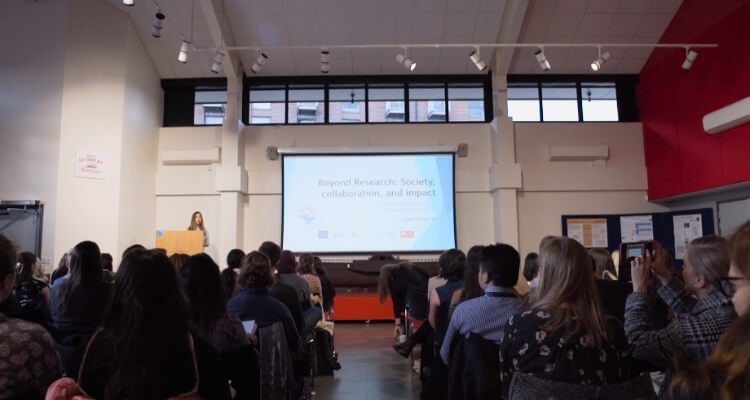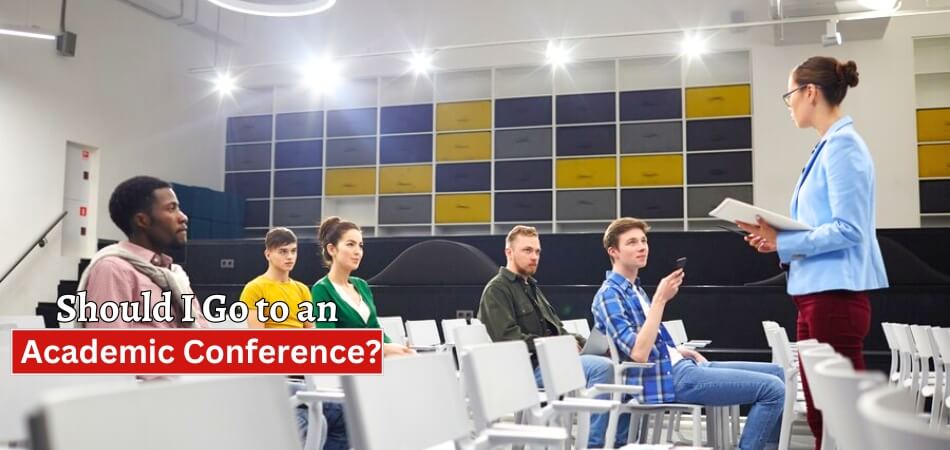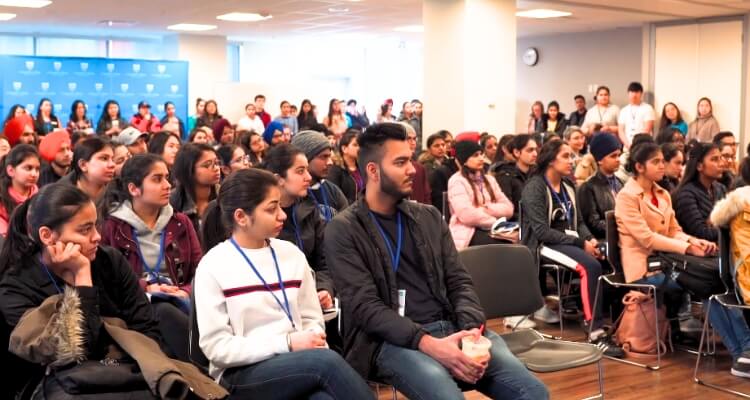An academic conference is a gathering of scholars, researchers, and professionals to discuss their latest findings, share knowledge, and network. These events provide a platform for presenting research, learning from experts, and engaging in meaningful discussions. So, should I go to an academic conference?
Yes, you should go to an academic conference. Attending and presenting at academic conferences adds value to your resume, showcasing your proactive approach to learning and sharing knowledge. It’s a great opportunity for professional growth, networking, and gaining new insights in your field.
To explore more about the benefits and how to make the most of your conference experience, continue reading the rest of the article.
Core Purpose of Academic Conference
Academic conferences serve as essential platforms for researchers, educators, and students to share new insights. These gatherings bring experts together to discuss emerging ideas and connect with similar minds. Attendees gain exposure to innovative studies, methods, and tools, which develop their professional skills. Many are drawn to the upcoming conferences in Canada or other European countries to exchange ideas and expand their knowledge of current research.

Networking is another core purpose of academic conferences, fostering collaboration and future research projects. Participants engage in conversations that lead to potential partnerships, enriching their academic and career journeys. Conversations often inspire fresh research ideas, pushing the boundaries of traditional knowledge. Meeting experts and like-minded individuals is highly valuable for those looking to make lasting connections.
Furthermore, academic conferences expose participants to new knowledge and new perspectives, which promotes ongoing learning. Each presentation reveals new methods, findings, and techniques, broadening participants’ understanding of diverse fields. Workshops and panel discussions help attendees strengthen their professional skills through hands-on learning. For many, these conferences have become an inspiring experience that fuels their passion for continuous academic growth.
Should I Go to An Academic Conference?
Yes, you should go to an academic conference. Attending an academic conference can be a transformative experience for anyone involved in research or higher education. It’s an opportunity to dive deep into your field, see what your peers are up to, and broaden your horizons. If you’re on the fence about whether to attend, consider the various benefits it offers.
Professional Networking
Meeting new colleagues in your field can open doors to collaborative opportunities you hadn’t considered before. These connections can lead to joint research projects or even job offers in the future. Networking at conferences often results in lasting professional relationships that are beneficial for career growth.
Learning Opportunities
Every session you attend is a chance to absorb information that might not yet be published or widely discussed. You’ll hear about the latest research and innovative methodologies that are pushing the boundaries of your discipline. This exposure to new ideas can significantly enhance your own work and inspire new research directions.
Presentation Skills
Presenting your research in a public forum is an excellent way to refine your speaking and presentation skills. Feedback from knowledgeable peers helps you understand how your work is perceived from the outside. This can improve not only your current presentation but also how you communicate your research in the future.
Access to Advanced Workshops
Workshops led by experts offer practical skills and insights that you might not gain in your home institution. These are intensive sessions designed to teach new techniques or software that are crucial for advancing in your field. Engaging actively in these workshops can greatly enhance your practical skill set.
Publications and Feedback
Getting feedback on your research before it reaches the publication stage is invaluable. This input can help you refine your arguments and improve the clarity of your findings. It’s also a chance to discuss your work in depth with experts who are interested in your research area.
Renewed Motivation and Inspiration
The energy at a conference can reignite your passion for your field, especially when interacting with passionate peers. Seeing the excitement and dedication of others can remind you why you chose your field of study. It’s a motivational boost that can keep you energized for months.
How to Choose the Right Academic Conference?
Choosing the right academic conference can significantly impact your research, networking opportunities, and career growth. With so many conferences out there, finding the perfect fit for your goals and interests can feel challenging. This guide will walk you through key steps to identify and select the conference that best aligns with your professional and academic needs.
Step 1: Determine Your Conference Goals
First, clarify what you aim to achieve by attending a conference. Some focus on networking, while others emphasize research dissemination or skills development. Identifying your primary goals helps you find a conference tailored to your needs. This clarity will streamline your choices and ensure you invest time in the most valuable event.
Step 2: Research Conference Reputation
Not all conferences maintain the same standards, so evaluating a conference’s reputation is essential. Look into past event feedback, organizer credentials, and speaker quality. Attending respected conferences connects you with reputable experts and strengthens your academic credibility. A reputable conference also ensures a productive and enriching experience.
Step 3: Consider Relevance to Your Field
Choose conferences that closely align with your specific research area or interests. Conferences covering your field offer discussions and sessions that provide value to your work. This focus guarantees that you’ll gain insights, contacts, and knowledge directly applicable to your goals. Relevant conferences offer the most rewarding and inspiring experience.
Step 4: Evaluate Conference Size and Format
Smaller conferences foster in-depth discussions and closer networking, while larger ones offer a broader range of sessions. Consider your comfort level with crowds and preferred learning style when choosing. Larger events may overwhelm, but they provide access to a wider audience and ideas. Decide what format best supports your learning and engagement.
Step 5: Check Location and Budget
The location and costs, including travel and accommodation, are important factors in your decision. Local events may be more affordable, but international ones offer unique insights and networking opportunities. Factor in your budget to see if the conference fits your financial plan. Being realistic with finances ensures a stress-free experience.
Step 6: Plan with Pre-Conference Preparation
Once you’ve selected a conference, plan your steps to get ready for an academic conference to maximize your experience. Preparing early allows you to schedule sessions, gather necessary materials, and finalize travel plans. Effective preparation ensures that you make the most of your conference investment. This approach also allows you to focus on learning and networking.
Who Can Attend the Academic Conference?
Academic conferences are open to a wide audience, including researchers, faculty, students, and industry professionals. Attendees usually include those presenting papers, participating in discussions, or seeking knowledge and networking opportunities within their field of study or interest. Here’s a detailed guide on this.
Researchers and Academics
At academic conferences, researchers and academics make up the majority of the attendees. As part of the conference, the researchers present their latest findings and participate in scholarly discussions. These conferences offer a platform to gain feedback and collaborate on future projects.
Graduate and Undergraduate Students
There are also academic conferences that are open to graduate and undergraduate students. As a result of these events, you will be able to gain valuable learning experiences as well as networking opportunities. Students often gain insights that can enhance their academic and professional development.
Industry Professionals
Industry professionals attend conferences to stay updated with the latest research and trends. They can apply new knowledge to their work environments. Networking with academics and other professionals can lead to potential collaborations and innovations.
Educators and Teachers
Educators and teachers benefit greatly from attending academic conferences. They gain new teaching methodologies and resources. These conferences help educators stay informed about the latest developments in their subject areas.
Policymakers and Administrators
Policymakers and administrators attend academic conferences to understand the implications of research findings. They use this knowledge to inform policy decisions. Networking with researchers provides them with a broader perspective on key issues.
Tips for Making the Most of Your Experience on The Academic Conference Journey
Attending an academic conference can be a rewarding experience that enhances your professional growth and knowledge. To maximize the benefits, find an academic conference in your field, prepare and engage fully, and understand all the requirements for attending academic conferences to learn the latest trends and share innovative ideas. Here are some tips for making the most of your academic conference journey.
- Make a Plan: Planning is crucial for a successful conference experience. Register early to secure your spot and access early-bird discounts. Review the conference schedule and identify sessions that interest you.
- Network Actively: Networking is a vital part of academic conferences. Introduce yourself to fellow attendees and exchange contact information. Attend social events to build meaningful professional relationships.
- Engage in Sessions: Participate actively in conference sessions. Ask questions and contribute to discussions to gain deeper insights. Engaging with presenters and attendees can enhance your understanding of the topics.
- Take Notes: Taking notes during sessions helps retain important information. Highlight key points and ideas that resonate with you. Review your notes later to consolidate your learning and apply it to your work.
- Present Your Work: Presenting your research at a conference can boost your professional profile. Prepare thoroughly and practice your presentation multiple times. Seek feedback from peers to refine your delivery and content.
- Manage Your Time: Effective time management is essential during a conference. Prioritize sessions and activities that align with your goals. Allow time for networking and attending key presentations without feeling rushed.
- Follow-Up: Following up with contacts after the conference is important. Send emails to thank new connections and discuss potential collaborations. Maintain relationships by staying in touch and sharing relevant updates.
FAQs for Should I Go to An Academic Conference?
Attending academic conferences can be a significant decision for your professional and academic development. Here are some frequently asked questions and their answers to help you decide if you should attend.
How Can Attending a Conference Improve My Resume?
Listing conference presentations on your resume highlights your active engagement in your field. It demonstrates your commitment to continuous learning and professional growth, making you a more attractive candidate for jobs and promotions.
What Should I Expect at An Academic Conference?
Expect a mix of presentations, panel discussions, workshops, and networking events. You’ll have opportunities to learn about the latest research, share your work, and connect with peers and experts in your field.
How Do I Choose the Right Conference to Attend?
Choose a conference that aligns with your research interests and professional goals. Look for events with relevant topics, reputable organizers, and opportunities for networking and presenting your work.
Can Students Benefit from Attending Conferences?
Yes, students can gain invaluable insights and experience by attending conferences. They can learn from experts, network with professionals, and gain exposure to the latest research trends, enhancing their academic and career development.
What Are the Costs Involved in Attending a Conference?
Costs can include registration fees, travel, accommodation, and meals. Look for funding opportunities such as university grants, scholarships, and travel awards to help offset these expenses.
How Can I Prepare for A Conference?
Prepare by reviewing the conference schedule, identifying sessions of interest, and planning your itinerary. Practice your presentation if you’re presenting, and bring business cards for networking.
What Are the Networking Opportunities at Conferences?
Conferences offer numerous networking opportunities, including social events, workshops, and informal gatherings. These interactions can lead to collaborations, mentorship, and professional relationships that benefit your career.
Should I Present My Research at A Conference?
Yes, presenting your research at a conference can enhance your professional profile. It allows you to share your findings, receive feedback, and engage with a broader audience, which can be invaluable for your academic and professional growth.
Bottom Line
The benefits of attending academic conferences range from enhancing your resume to networking. Gain valuable feedback and build your professional reputation by presenting your research. Engaging with peers and experts encourages collaborations and keeps you up-to-date on trends.
So, should I go to an academic conference? The answer is a definite yes. You can showcase your work, learn from others, and connect with professionals at these conferences. Growth and development opportunities abound for researchers, students, and industry professionals.
During academic conferences, it is important to plan, network actively, attend sessions, and follow up with new contacts that you have made. Make the most of your experience by using these strategies to make the most of it. Advance your career and expand your knowledge with these opportunities.







